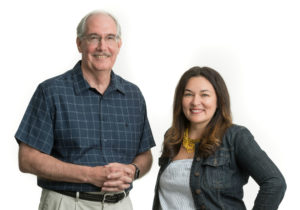Gene Gloeckner and Louise Jennings, co-directors of Colorado State University’s School of Education, recently announced the appointment of new leadership for the School’s Higher Education Leadership doctoral specialization.
Following the retirement of longtime HEL coordinator Linda Kuk, Assistant Professor Susana Muñoz and Student Affairs in Higher Education faculty member David McKelfresh have assumed co-leadership of the HEL specialization.
 “I’m really excited about this opportunity,” said Muñoz. “I have to give credit to Linda for building the HEL program to its current caliber – for ten years, she’s provided a really good foundation for the program, and I’m thankful she was able to build the program to where it is today.”
“I’m really excited about this opportunity,” said Muñoz. “I have to give credit to Linda for building the HEL program to its current caliber – for ten years, she’s provided a really good foundation for the program, and I’m thankful she was able to build the program to where it is today.”
“Linda began and expanded the HEL program to be one of the most competitive programs of its kind in the country. Last year, HEL had around 100 applications for 12 positions,” expanded Gloeckner. “Her service to our School of Education and her previous experience at CSU as Vice President for Student Affairs helps her relate to the everyday experiences of our HEL students.”
“Susana has been recognized as one of the top HEL faculty members in the country,” he continued. “Her research focus related to the experience of the international student, especially Deferred Action for Childhood Arrivals students, led to recognition on President Obama’s White House website. We are excited that she is willing to take on this key leadership role.”
Capitalizing on strengths
The HEL specialization is a distance-delivered doctoral degree program geared toward current higher education administration professionals who seek to successfully and ethically lead higher education institutions worldwide. Admitted into cohorts each summer, its students come from across the globe and work in a variety of leadership capacities at an array of institutions. These factors, said Muñoz, along with the small (12-15 students) cohort size, lead to rich conversations among students and faculty throughout the four-year coursework period – and beyond.
“We’ve managed to attract and admit some of the most phenomenal students that I’ve ever had the opportunity to work with,” said Muñoz.
The co-leadership model is new to the HEL program, but not to the School of Education. Several of its programs are led by co-chairs, and the school itself is currently led by co-directors.
“Having two people coordinating will help bring different energies to the HEL specialization,” said Muñoz. “I’m looking forward to working with Dave McKelfresh, as well as the leaders of the SAHE program.”
Muñoz couldn’t have hoped for a stronger partner, in terms of student affairs knowledge and expertise, than McKelfresh. Muñoz shared that she considers McKelfresh, a SAHE faculty member for 30 years, a pillar of the field.
“I’m excited to continue learning from him,” she said.
Evolving to meet student needs
The move offers an opportunity to refresh aspects of the program, changes Muñoz feels will ensure the HEL program at CSU continues to effectively train the next generation of practitioners in the field. The biggest change, aside from leadership, will be a closer alignment and partnership with the SAHE master’s degree program, also part of the School of Education.
“Many programs across the nation don’t necessarily distinguish SAHE and HEL as different fields,” explained Muñoz. “Most have a master’s track and a doctoral track that incorporate student affairs and higher education administration. I envision our SAHE master’s students and HEL doctoral students taking classes together – I feel that’s very powerful, and these students would benefit from those rich conversations that take place.”
A strong collaboration between HEL and SAHE will offer benefits to the doctoral and master’s students in each program, including opportunities for advising, teaching and mentoring, as well as research and other partnerships.
“Partnerships between our SAHE and HEL faculty members on research and conference presentations, as well as offering HEL students and faculty the opportunity to publish together will have a strong impact on our two programs,” said McKelfresh.
“Dave has led or co-led our SAHE program for many years,” said Gloeckner. “His leadership is legendary at CSU, and has placed our SAHE program in the top three in the country. We are honored to have him join Susana in co-coordinating the HEL specialization.”
“Dave knows the SAHE program inside and out,” said Jody Donovan, co-chair of the SAHE program. “Susana earned her SAHE master’s degree from CSU, and has been teaching doctoral students for a number of years. Together, they bring terrific knowledge and energy that will maximize the HEL and SAHE programs’ offerings to benefit students at all levels.”
Collaboration to effect change
Recent cluster hires in the School of Education, said Muñoz, show the school’s commitment to furthering social justice, equity and inclusion.
“We have to think about how the HEL program – along with SAHE – can bring that vision to realization,” she said. “It’s an exciting time for both programs; in the long run, this is exactly what the field needs and we’re hoping to be leaders in that shift.”
The goal, said Muñoz, is to equip HEL students to make a difference at their institutions and in their communities.
“We want folks who are going to be change agents on their campuses and who want to transform and lead their institutions in different ways than perhaps has been done in the past,” she said.
The School of Education is part of CSU’s College of Health and Human Sciences.